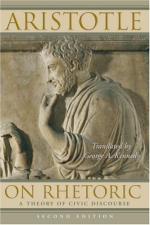
|
| Name: _________________________ | Period: ___________________ |
This quiz consists of 5 multiple choice and 5 short answer questions through Book II, Chapters 23-26.
Multiple Choice Questions
1. What did Aristotle think anger was always directed towards?
(a) A specific circumstance.
(b) A specific person.
(c) A specific person or group, or a specific circumstance.
(d) A group of people.
2. Why did Aristotle think the political rhetorician should show that their proposal was in line with the audience's happiness?
(a) To encourage them to consider it.
(b) To convince them to accept it.
(c) To prevent them from forgetting it.
(d) To help them understand it.
3. Based on Aristotle's explanation of the wealthy, how did wealthy people view the opinions of others about money?
(a) They thought that everyone shared their view of money.
(b) They thought that most people were incapable of understanding their view of money.
(c) They thought that most people understood their view of money, but did not understand the reasons for it.
(d) They thought that everyone disagreed with their view of money.
4. What did Aristotle think the extent of virtues was based on?
(a) Certain accomplishments.
(b) Certain circumstances.
(c) Past associations.
(d) Past actions.
5. Who did Aristotle think must obey the general law?
(a) At least three quarters of humanity.
(b) All of humanity.
(c) At least half of humanity.
(d) Over half of humanity.
Short Answer Questions
1. Which of the following was a reason that Aristotle included as a cause of pity?
2. What did Aristotle think a political orator should be aware of?
3. According to Aristotle, what was the most basic cause of pleasure?
4. According to Aristotle, how many ways could objections be raised?
5. How many non-technical means of persuasion did Aristotle discuss in Book I, Chapter 15?
|
This section contains 314 words (approx. 2 pages at 300 words per page) |

|




